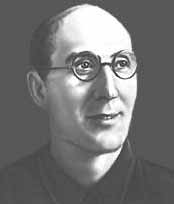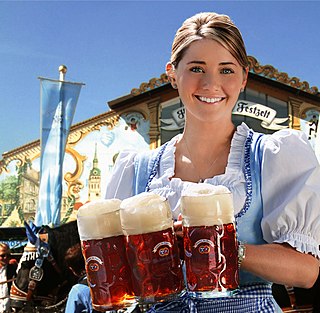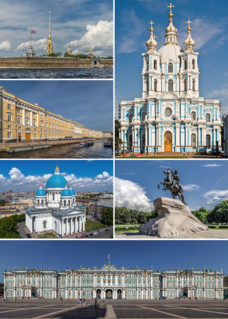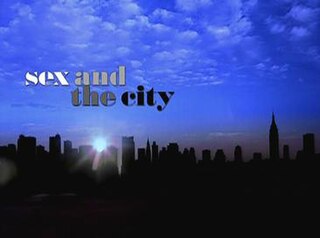
Sex and the City is an American romantic comedy-drama television series created by Darren Star and produced by HBO. Broadcast from 1998 until 2004, the original run of the show had a total of 94 episodes. Throughout its six-year run, the show received contributions from various producers, writers, and directors, principally Michael Patrick King.

Rosemary's Baby is a 1967 horror novel by American writer Ira Levin, his second published book. It sold over 4 million copies, "making it the top bestselling horror novel of the 1960s." The commercial success of the novel helped launch a "horror boom", where horror fiction would achieve enormous commercial success.

Commissar is a 1967 Soviet film based on one of Vasily Grossman's first short stories, "In the Town of Berdichev". The main characters were played by two People's Artists of the USSR, Rolan Bykov and Nonna Mordyukova. It was made at Gorky Film Studio.

Anastasiya Andreyevna Myskina is a former professional tennis player. She won the 2004 French Open singles title, becoming the first Russian female tennis player to win a Grand Slam singles title. Subsequent to this victory, she rose to No. 3 in the WTA rankings, becoming the first Russian female tennis player to reach the top 3 in the history of the rankings. In September 2004, she reached a career-high ranking of No. 2. She has not retired officially, but has been inactive on the WTA Tour since May 2007.
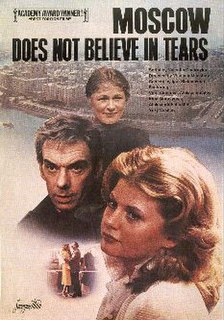
Moscow Does Not Believe in Tears is a 1980 Soviet film made by Mosfilm. It was written by Valentin Chernykh and directed by Vladimir Menshov. The leading roles were played by Vera Alentova and by Aleksey Batalov. The film won the Academy Award for Best Foreign Language Film in 1981.

Doctor Zhivago is a novel by Boris Pasternak, first published in 1957 in Italy. The novel is named after its protagonist, Yuri Zhivago, a physician and poet, and takes place between the Russian Revolution of 1905 and World War II.

Lyudmila Stefanovna Petrushevskaya is a Russian writer, novelist and playwright. She began her career writing and putting on plays, which were often censored by the Soviet government, and following perestroika, published a number of well-respected works of prose.
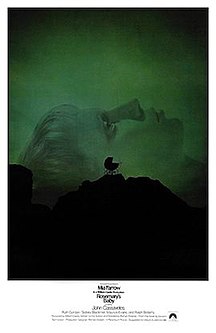
Rosemary's Baby is a 1968 American psychological horror film written and directed by Roman Polanski, based on Rosemary's Baby by Ira Levin. The cast features Mia Farrow, John Cassavetes, Ruth Gordon, Sidney Blackmer, Maurice Evans, Ralph Bellamy, Angela Dorian, Clay Tanner, and, in his feature film debut, Charles Grodin. The film chronicles the story of a pregnant woman who suspects that an evil cult wants to take her baby for use in their rituals.

Ruslana Sergeyevna Korshunova was a Kazakh model of Russian descent. She established herself as a rising figure in the fashion industry by posing for magazines including Vogue and designers such as Vera Wang and Nina Ricci.
Korshunova's unexpected death, which was ruled a suicide, became a longtime controversial subject of international attention.

The Unknown Woman is a 2006 Italian psychological thriller mystery film, directed by Giuseppe Tornatore that depicts a woman alone in a foreign country, haunted by a horrible past.

Sunflower is a 1970 Italian drama film directed by Vittorio De Sica. It was the first western movie to be filmed in the USSR. Some scenes were filmed near Moscow, while others near Poltava, a regional center in Ukraine.
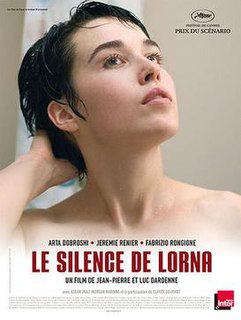
Lorna's Silence is a 2008 drama film by the Belgian brothers Jean-Pierre and Luc Dardenne. It was the winner of the 2008 LUX Prize, as well as the Best Screenplay Award at the 2008 Cannes Film Festival.

Maria Krushevskaya is a Russian harpist. She was the Gold Medalist of the 2007 USA International Harp Competition, where she was awarded the Jan Jennings Prize for best performance of Pierné’s Concertstück for Harp and Orchestra, the Mary L. Ogg Prize for best performance of Küne’s Fantaisie sur un theme de l’opera Eugene Onegin, and best performance of Alvars' Introduction and Variations on Themes from Bellini’s Opera Norma.
Maria Krushevskaya was born in Moscow in 1984 in a family of musicians. She began to study music at the age of five. In 1992 she entered the Moscow Gnessin School of Music, graduating with distinction in 2002 and subsequently continued her studies at the Gnesins’ Russian Academy of Music from which she also graduated with distinction in 2008.
Kamli is a 2006 Telugu film directed by K.N.T. Sastry. The film stars Nandita Das in the title role of a Lambada girl. The film was showcased at the Busan International Film Festival in Korea and the Asian Film Festival in Mumbai.

Liya Medzhidovna Akhedzhakova is a Soviet and Russian film, stage and voice actress who received the title of People's Artist of Russia in 1994. She received two Nika Awards as the best supporting actress and the 2014 Nika Honorary Prize.

Elena Sergeevna Katina, better known as Lena Katina, is a Russian singer and songwriter who is best known for her work with Russian duo t.A.T.u. She started her career at the age of eight joining the Russian children's act Avenue, and soon after that, joining Neposedi. In 1999 Ivan Shapovalov chose Lena Katina for his project, t.A.T.u., as well as Julia Volkova. The duo would later become Russia's most successful pop music act. The group produced several hits including "All the Things She Said", "Not Gonna Get Us" and "All About Us".
Their first single "All The Things She Said" peaked at number one in 19 countries including the UK, Russia and Australia.
Galina Sergeevna Kravchenko was a Russian actress.

Maria Ivanovna Arbatova, is a Russian novelist, short story writer, playwright, poet, journalist, talkshow host, politician, and one of Russia's most widely known feminists in the 1990s. When growing up, she was already showing strong controversial ideologies, for instance, she refused to join the Young Communist League, for she preferred to be "a hippy". She studied at the Faculty of Philosophy at the Moscow State University, in the Dramatic Arts division of the Gorky Literary Institute, and underwent training in psychoanalysis. She had to leave state university of Moscow "due to ideological conflicts." When she was 19, she became a mother of twins, which complicated her educational processes. She continued studying at the Maxim Gorky Literature institute. After finishing her studies, Maria published some prose and poetry works, however she returned to writing drama, as she claims it is more natural expression for her than other genres.In the pre-perestroika years, the years before 1985, her literary works were banned by censorship. Before glasnost and perestroika, the political program of restructuring and openness of Michail Gorbatsjov, Arbatova had just one play staged, a play that was commissioned. An example of a play that was censored is the play called "Equitation with two knowns". It was banned by the ministry of culture for 10 years. The play is about a female genealogist performing abortions. The play was misinterpreted as a statement of good or bad of abortion. However the purpose of the play is to bring up the unfair share of responsibility for birth control and child-raising. Nowadays Arbatova is a member of the Moscow Writer's Union and the Union of Theatrical Workers of Russia. She is the author of fourteen plays staged in Russia and abroad, twenty books, and numerous articles in newspapers and periodicals. She has received multiple accolades for her literary and public achievements.

Baby is a 2015 Indian Tamil horror film directed by D Suresh. The story revolves around a separated couple who later reunite to protect their daughter from being haunted.

Kristina Ruslanovna Pimenova is a Russian child model and actress, living in the United States. She has an elder half-sister.

